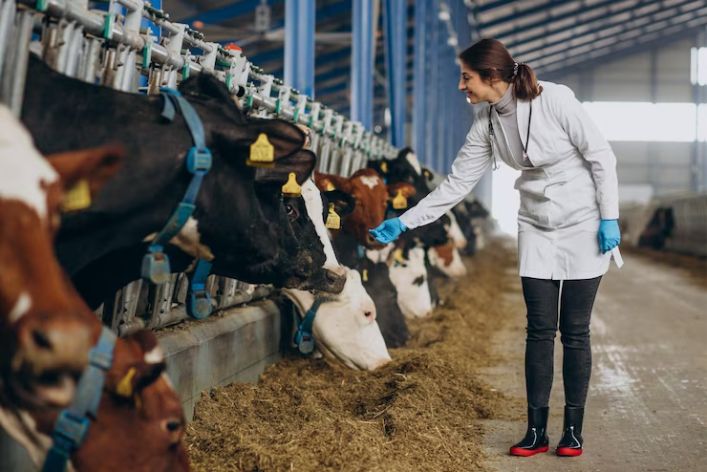Introduction
Nigeria is a country in West Africa with a population of over 200 million people. Agriculture is one of the major sectors of the Nigerian economy, employing about 70% of the labor force.
The sector contributes significantly to the country’s Gross Domestic Product (GDP) and is a major source of food for the population.
It is important to discuss the role of agriculture in Nigeria as the sector faces various challenges that affect its growth and development. These challenges include inadequate financing, poor infrastructure, climate change, and inadequate policy support, among others.
However, the agriculture sector in Nigeria offers numerous career opportunities. These opportunities range from crop production, livestock farming, fisheries, agro-processing, marketing, research, and extension services.
With the increasing demand for food and food products, the sector has huge potential for growth, which creates more opportunities for individuals interested in agriculture.
In recent years, the government has initiated policies and programs aimed at supporting the growth and development of the agriculture sector. These include the “Agriculture Promotion Policy (2016-2020)”, the “Anchor Borrowers’ Program”, and the “Growth Enhancement Support Scheme”.
Generally, the role of agriculture in Nigeria cannot be overemphasized. Despite the challenges facing the sector, there are significant opportunities for individuals interested in pursuing a career in agriculture.
With the right policies, financing, and infrastructure, the sector has the potential to contribute significantly to the country’s economic growth and development.
Read: Changing Nigeria: Careers in Sustainable Agriculture
Current Status of Agriculture in Nigeria
Agriculture is a vital sector of the Nigerian economy, contributing significantly to the country’s Gross Domestic Product (GDP), employment, and foreign exchange earnings.
Nigeria is blessed with fertile land, abundant rainfall, and a favourable climate for farming, making it an agricultural powerhouse in Africa.
Overview of the agriculture sector in Nigeria
The agriculture sector in Nigeria has undergone considerable transformation over the years, transitioning from subsistence farming to commercial agriculture.
The sector engages over 70% of the population, making it the largest employer of labour in the country. Additionally, smallholder farmers account for about 95% of agricultural production in Nigeria.
The government has been providing support to the agriculture sector, including policies aimed at improving agricultural productivity, creating agribusiness investment opportunities, and enhancing access to finance for farmers.
Furthermore, the government aims to develop the sector by improving infrastructure, promoting value-addition, and enhancing marketing opportunities for agricultural produce.
Major crops grown in Nigeria
Nigeria is blessed with a diverse range of agro-ecological zones, supporting the cultivation of various crops all year round. The country is known for its vast production of crops such as cocoa, cassava, maize, rice, sorghum, yams, and millet.
Other crops include oil palm, groundnut, cowpea, soybean, and vegetables such as tomatoes, peppers, and onions. The country is also the largest producer of sesame seed in Africa.
The growth of the agriculture sector in Nigeria has led to an increase in the production of cash crops, resulting in a significant improvement in the country’s foreign exchange earnings.
For instance, the cocoa industry in Nigeria is a major contributor to foreign exchange earnings, with the country being the fourth largest producer of cocoa globally
Livestock rearing in Nigeria
Livestock rearing is another aspect of agriculture that is widely practiced in Nigeria, with the sector accounting for about 20% of the country’s agricultural GDP.
Nigeria is known for its production of livestock such as poultry, cattle, sheep, goats, pigs, and fish. The country is also a significant producer of dairy and meat products.
The demand for livestock products in Nigeria is high, with the country being one of the largest consumers of meat in Africa.
The government has been implementing various programmes to improve livestock production, including the establishment of ranches, artificial insemination, and vaccination programmes to prevent livestock diseases.
Nigeria’s agriculture sector, a vital economic pillar, offers extensive career growth opportunities. Careers span from environmental consultancy to agricultural economics.
The sector demands skilled professionals in areas like agricultural research and technology development. Modern tech brings emerging roles in precision agriculture, farm robotics, and data analytics.
The sector significantly boosts Nigeria’s GDP and employment rate, contributing to sustainable economic development. Thus, the government’s continued focus remains crucial for further growth, presenting ample opportunities for the country’s youth.
Read: Making a Living: Poultry Farming Careers in Nigeria
Career Opportunities in Agriculture in Nigeria
Agriculture is one of the most important sectors in Nigeria, providing a significant source of income and livelihoods for millions of people.
This sector has become increasingly important over the years, as the Nigerian economy strives to diversify and create sustainable income streams.
Let’s take a closer look at the various career opportunities that exist within the agriculture sector in Nigeria.
Overview of the various career options in the agriculture sector in Nigeria
The agriculture sector in Nigeria offers a wide range of career opportunities across different segments of the value chain, from farming and production to research and development, marketing, and sales. Here are some of the sectors that offer career opportunities in the agriculture sector:
- Farming and Agriculture Production
- Agricultural Research and Development
- Marketing and Sales of Agricultural products
- Farming support services i.e. soil testing and advisory services, machinery sales and maintenance, insecticide, and pesticide sales, etc.
Jobs in agriculture production/management
Working in agriculture production involves the actual cultivation and production of crops or livestock. There are various job opportunities in this sector. Some of the job positions available are:
- Farm manager
- Farm worker/ attendant
- Agricultural Engineer
- Agronomist
- Livestock attendant
- Agric Extension Officer
Careers in agricultural research and development
Agricultural research and development can be a rewarding career path for those interested in improving farming practices, developing new technologies, and finding ways to increase yields and improve food security. Some of the job positions that exist are:
- Agricultural Research Scientist
- Biotechnologist
- Soil Scientist
- Pest Control Specialist
- Food Scientist and Technologist
Potential for Entrepreneurship in Agriculture in Nigeria
Entrepreneurship and farming go hand in hand in Nigeria. There is a tremendous potential for entrepreneurs to build successful and profitable businesses in agriculture. Here are some of the potential business ventures:
- Food Processing and packaging
- Agriculture Equipment leasing and sales
- Fish farming and Aquaculture
- Livestock feed production and sales
- Agricultural training and capacity building
- Organic farming and sales of organic products
Essentially, careers in the agriculture sector in Nigeria are vast and varied. Considering the country’s huge population and immense agricultural potential, there is a need for more investment in agriculture to unlock its full potential.
The government and private sector investors can play a significant role in creating the enabling environment and investing in this sector that can help improve livelihoods and create employment opportunities for Nigerians.
Read: Essential Guide to Crop Farming Jobs in Nigeria

Gain More Insights: Ethics and Animal Geneticists: A Nigerian Perspective
Factors Affecting Agriculture in Nigeria
Agriculture in Nigeria, a backbone of the economy, encounters challenges hindering its growth and development. These challenges include inadequate infrastructure, limited credit access, insufficient extension services, and restricted technology and tools.
Climate change significantly impacts Nigerian agriculture, with frequent floods and droughts threatening productivity, resulting in economic losses.
Limited technology and information access affect farmers, particularly in rural areas, relying on less efficient traditional practices.
Inadequate funding and investment limit the sector’s progress, neglecting rural infrastructure and hindering research and development.
Despite challenges, Nigerian agriculture offers career opportunities, such as crop scientists, plant pathologists, and agribusiness roles.
To succeed, aspiring professionals can pursue agricultural degrees, participate in vocational training programs, and gain practical experience.
In conclusion, Nigerian agriculture faces challenges like climate change, limited technology access, and insufficient funding. However, opportunities exist for young professionals to contribute to its development by acquiring skills and knowledge.
Solutions to Enhance Agriculture in Nigeria
In recent years, the Nigerian government has made considerable efforts to revitalize the agricultural sector by diversifying the economy and increasing food production.
However, several challenges are facing the agriculture sector, and it requires strategies for enhancing agriculture in Nigeria.
Let’s discuss solutions to enhance agriculture in Nigeria, the role of the government in promoting agriculture, and the importance of promoting sustainable agriculture practices.
Strategies for Addressing the Challenges Facing Agriculture in Nigeria
- Investment in research and development activities to improve crop yields and increase the production of value-added crops.
- Providing farmers with access to affordable credit facilities and ensuring the availability of farming inputs. This includes fertilizers, pesticides, and improved seedlings.
- Creating an enabling environment for private investment in agriculture. The government should create policies that encourage private sector investment in agriculture, and provide incentives to those who invest in the sector.
- Improving the transportation and storage infrastructure in rural areas. This involves constructing and maintaining rural roads, building storage facilities and promoting the use of appropriate methods for preserving agricultural produce.
- Adopting technologies and adopting best practices to promote efficient and sustainable use of resources. This includes embracing modern technology such as irrigation systems and mechanization. The use of climate-smart agriculture practices should also be encouraged.
The Role of Government in Promoting Agriculture in Nigeria
The Nigerian government plays a vital role in promoting sustainable agriculture, improving production, and enhancing food security in the country. The government can do this by:
- Creating an enabling environment for agricultural growth through policies and regulations that support investment in the sector. Policies such as taxes, import duties, and land acquisition should be conducive to the growth of the sector.
- Allocating more resources to agriculture to provide for research and development activities, infrastructure development, and farmer education and training programs.
- Collaborating with the private sector to provide farmers with access to credit facilities, training and technical assistance, and farming inputs such as fertilizers and seeds.
- Promoting agricultural insurance that can protect farmers from losses due to natural disasters or other unforeseen circumstances.
- Supporting the establishment of farmer cooperatives, which can help farmers pool resources, improve production, receive training and technical assistance, and access markets.
The Importance of Promoting Sustainable Agricultural Practices
Promoting sustainable agriculture practices can have significant benefits for Nigerian farmers, the environment, and the economy. Sustainable agricultural practices can:
- Preserve and protect natural resources such as water and soil. Sustainable practices such as conservation agriculture and precision farming can help reduce the use of water and chemicals, therefore protecting the environment.
- Improve soil quality and crop yields. Sustainable practices such as crop rotation, intercropping, and the application of organic manure can improve soil fertility and crop yields.
- Reduce greenhouse gas emissions. Sustainable agriculture practices such as conservation tillage can help reduce greenhouse gas emissions by storing carbon in the soil.
- Provide Economic benefits. Sustainable agriculture can create jobs and income for rural communities, stimulate local economies and reduce rural poverty.
- Ensure food security. Sustainable agriculture practices can enhance food security by increasing food production and stabilizing food prices.
Enhancing agricultural productivity in Nigeria requires addressing several challenges through a mix of strategies ranging from research and development, improving infrastructure, and embracing technology.
The government has a critical role to play in providing an enabling and supportive environment through policies and regulations that can propel the sustainable growth of the sector.
Promoting sustainable agricultural practices and emphasizing the benefits of adopting these practices to farmers, consumers, and the environment can facilitate increased adoption and awareness.
Read: Key Agricultural Professions: Boosting Nigeria’s Economy
Conclusion
Agriculture plays a vital role in the economy of Nigeria. It provides employment opportunities, sources of income, and food security while contributing to the country’s Gross Domestic Product.
The agriculture sector has a vast potential for growth and development, with untapped opportunities in crop production, livestock farming, fisheries, and agribusiness.
There are numerous career paths that ambitious and driven young people can take within Nigeria’s agriculture sector. From agronomy, animal science, and agricultural engineering to food processing, marketing, and entrepreneurship, the possibilities are endless.
Therefore, it is important to encourage more youths to consider careers in agriculture. The government and stakeholders in the sector should create an enabling environment, provide training and development opportunities, and offer financial support and incentives to attract and retain the best talents in the sector.
Finally, agriculture can transform Nigeria’s economy and contribute significantly to the country’s development. As such, there is a critical need to invest in this sector and to encourage more young people to see it as a viable career option. With dedication, hard work, and innovation, the opportunities in Nigeria’s agriculture sector are limitless.




